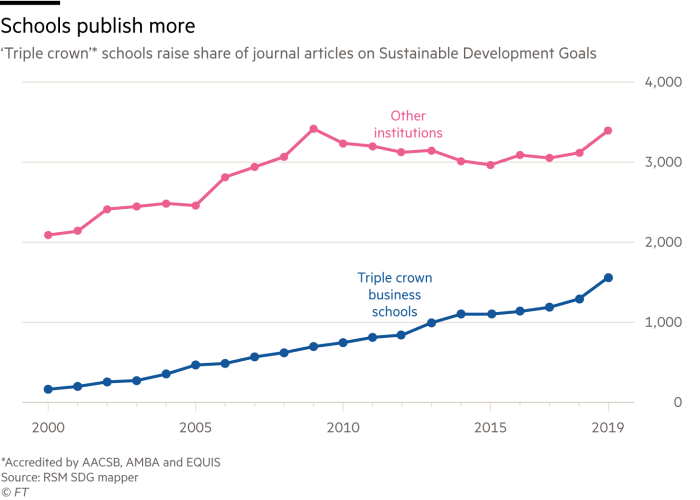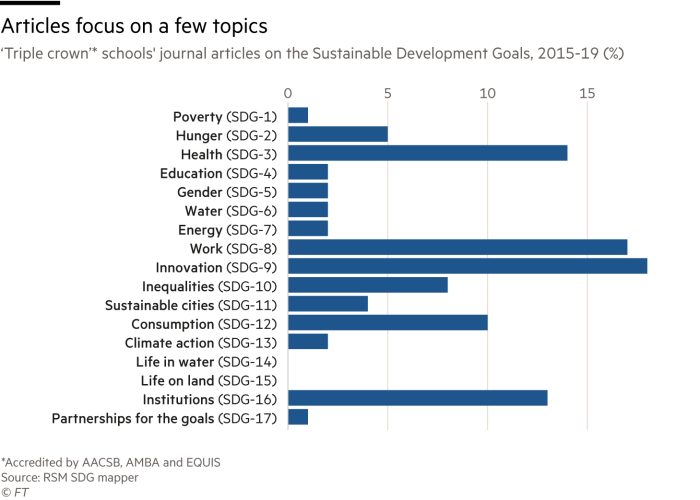Weighing up business schools’ work on sustainability

Simply sign up to the Sustainability myFT Digest -- delivered directly to your inbox.
Wilfred Mijnhardt has a problem. Europe is home to some of the world’s oldest and most prestigious business schools, and it has been at the forefront of much of the global innovation in teaching and research on sustainability.
But when he analyses institutions’ performance based on their position in overall rankings, let alone their academic research output, he finds a significant mismatch with those doing most to foster responsible business education.
Mijnhardt, policy director at Rotterdam School of Management at Erasmus University, is one of a growing number of specialists exploring ways to better capture such trends. It is also a question on which the FT is reflecting and canvassing views in conjunction with academic and sustainability groups. Notably, Mijnhardt has mapped the links between the business schools’ research output and the UN’s sustainable development goals (SDGs).
“Business schools are lagging behind [other disciplines],” he says. “They think that if they produce a few publications that count for rankings and accreditation purposes, they are doing research. But this world is much bigger than that and academic culture is so much more.”
Mijnhardt studied articles on SDGs written by business school staff since 2015 that were published in the FT50 list of influential journals. He found that the top institutions are increasingly focused on the field, with strong output in Europe from schools at the universities of Glasgow, Leeds and St Gallen, for instance.
But there are big gaps, with climate change-related topics explored far less in these articles than themes such as poverty reduction and innovation. Some of the articles with the greatest SDG relevance and impact are published in more obscure and less well-regarded journals.

Mijnhardt suggests business schools have moved more slowly than other academic departments to work on more interdisciplinary, collaborative and socially relevant themes. One reason is they are less reliant on — and accountable to — external research funders which are increasingly focused on the priorities of the SDGs. Instead, their research tends to be indirectly subsidised by high tuition fees or donations.
Jerry Davis, associate dean for business and impact at Ross School of Business at the University of Michigan, is more nuanced. “Business schools ironically are one of the last preserves where you are free to follow your mind where it goes, because you are not reliant on government or corporate funding,” he says. “We have potentially more academic freedom to uncover things.”

Schools with the prestigious ‘Triple crown’ of accreditation from the AACSB, AMBA and EQUIS are publishing more articles related to UN sustainable development goals in the FT50 list of influential academic journals used in business education rankings
Yet in practice, as a founding member of Responsible Research for Business & Management (RRBM), a network of academics pushing for “credible and useful research”, he says more needs to be done to reorient his peers’ activities to projects and publications that offer greater societal impact.
One critique of existing business school rankings, including the FT’s, is that their calculations do not focus so much on these topics. Instead, they draw on data points such as salaries that do not reflect — and may even potentially undermine — growing demand by students, faculty and employers for a greater emphasis on such social purpose, including in their academic output.
But there is a more fundamental issue for those keen to bring about change: the lack of consensus on ways to meaningfully assess such activities. Other assessments focused on the SDGs rely heavily on subjective, qualitative judgments by students and faculty. They are limited by reference to their own experiences and institutions, without an external benchmark.

Business school academics tend to focus heavily on particular SDGs, most notably health, innovation, work, consumption and institutions, while subjects such as the planet, poverty, education and gender receive relatively little attention
It is especially difficult to evaluate the impact of “environmental, social and governance” factors in classroom teaching or alumni careers. Even in academic research, long scrutinised through “bibliometrics” exploring the data around published research, there is little agreement on which measures to use.
Focusing on the content of articles that refer to the SDGs provides a proxy on the extent of activity around these issues. But it gives only a crude yardstick for the originality, value or applicability of the underlying research.
Specialists such as Amanda Goodall, associate professor at The Business School, City, University of London (formerly Cass), advocate expanding the range of publications that are taken into account beyond those in the widely recognised and prestigious FT50, to include more interdisciplinary and specialist journals. That would allow for a wider variety of themes but could also dilute the perceived academic quality.
Using citations by other academics of articles would help counter criticism by adding a peer assessment of the quality of any publication. But it does not give an indication of the impact beyond university walls: the extent to which research is read, shared and implemented by companies, governments and other organisations. References to articles on social media provide some external validation of interest but also a high degree of “noise”. A better approach might be take into account references to academic research in the media, specialist blogs and policy papers.
These are some of the issues on which the FT, RRBM, the UN’s Principles of Responsible Management network and others, including the Globally Responsible Leadership Initiative of business schools, are seeking views.
Despite the challenges, Prof Davis is optimistic about academia’s capacity to develop alternative measurements, in part because of fresh interest in societal impact within education and beyond. “Millennials have a pretty strong sense of social justice and the effect of the work they do. I’m very enthused by the coming generations,” he says.
Please share your views on how to better measure academic research at ft.com/ft50
Comments